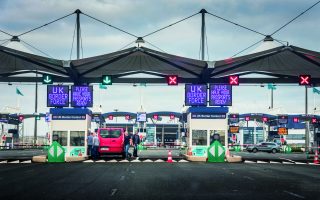What Covid tests and paperwork do I need for travel to France?


How have coronavirus and Brexit affected travel between France and the UK? The good news is from 11 February 2022, vaccinated travellers and under-18s do not need to do a Covid test when they enter the UK. For travel from the UK to France an essential reason is no longer needed although you will still need to do a pre-departure test. However, France’s Europe minister Clément Beaune told France 2 TV in early February that this requirement may soon be dropped for fully vaccinated travellers.
TRAVEL FROM UK TO FRANCE
From 14 January 2022, fully vaccinated UK visitors no longer need an essential reason to visit France, nor do they need to self-isolate on arrival, as they have done since 18 December 2021. On 4 February 2022, Consul Général Guillaume Bazard announced that vaccinated visitors can provide proof of a negative PCR Covid-19 test taken within 48 hours of departure, up from 24 hours. Unvaccinated travellers will still need to provide proof of a negative test taken within 24 hours of departure.
The story is different for unvaccinated UK visitors. For them, travel from the UK to France is still only permitted for essential reasons. This does not include tourism or visiting family. Valid reasons for travel include documented family and medical emergencies, diplomatic missions, priority health workers, transport professionals, and those whose can show that their journey is “economically necessary”. Unvaccinated travellers will still need to self-isolate for ten days on arrival in France too, and like their vaccinated counterparts, they will need proof of a negative PCR Covid-19 test taken within the previous 24 hours. Unvaccinated travellers will also need to fill out the ‘éOS Passager Form‘.
Things get slightly more confusing for young visitors from the UK to France. At the moment, under-18s (whether vaccinated or not) can travel to France with a vaccinated adult without an essential reason for travel and without having to self-isolate. However, under-18s travelling with an unvaccinated adult to France must follow the same rules as unvaccinated adults (have a compelling reason for travel and self-isolate upon arrival).
You will also need to show proof of your vaccination status – read more on how to use the NHS Covid Pass on your smartphone or a printed version.
Full France travel advice can be read on the UK government website and on the French Consular website.
TRAVEL FROM FRANCE TO UK
You will need to provide proof of your vaccination status (either NHS Covid Pass for England and Wales, NHS Scotland Covid Status app or CovidCert NI in Northern Ireland; or the paper certificate). Your final dose of the vaccine must have been administered at least 14 days before you arrive in the UK.
From 7 January 2022 , pre-arrival tests for people travelling to England will not be required. From 11 February 2022, vaccinated travellers will not be required to take a test when they enter the UK. Once in the UK, unvaccinated travellers must still take a Day 2 test but this can be a lateral flow test instead of a PCR. There is no requirement to self-isolate if the test is negative
Complete a passenger locator form – to be completed in the 48 hours before you arrive in the UK. You will need to enter your Covid-19 test booking reference number on your passenger locator form.
If you were vaccinated outside of the UK, you can check what proof is required for the country or territory where you were vaccinated.
If you are not fully vaccinated, you must:
Present a negative Covid-19 test, taken in the three days before you travel to the UK
Book and pay for day 2 and day 8 Covid-19 PCR tests, to be taken after arrival in the UK
Complete a passenger locator form in the 48 hours before you arrive in the UK
Quarantine at home or in the place you are staying for 10 full days
If either test result is positive, you must self-isolate for 10 full days (you may be able to end quarantine early if you pay for a private Covid-19 test through the Test to Release scheme)
Check the UK government’s full travel advice here.
Note that the information within this article is for those travelling between the UK and France. There are different rules depending on your country of departure, and these are outlined on the French government’s website.
ARE THERE ANY COVID RULES ONCE YOU’RE IN FRANCE?
A health pass (pass sanitaire) system is in place for many public venues in France (over-65s must show proof of their booster jab too, and from 15 January 2022 the health pass will no longer be valid without the booster dose). On 16 January 2022, the French parliament approved the introduction of a vaccine pass, meaning that in the future, people will need a vaccination certificate to enter some leisure and transport facilities. Currently, unvaccinated French people can use the country’s pass sanitaire, or health pass, with proof of a recent negative Covid-19 test. Keep track of the latest developments in our article about France’s ‘pass sanitaire’.
For now, under-18s travelling to France from the UK can still access France’s health pass with either full vaccination status or proof of a recent negative Covid-19 test.
Face masks are compulsory in all indoor public spaces including those requiring a health pass and in busy outdoor spaces. They will no longer be required outside from 2 February.
Also from 2 February, audience capacity limits for concert halls, sporting matches and other events will end, part of a gradual lifting of Covid-19 restrictions.

People vaccinated in the UK can import their NHS QR code into France’s TousAntiCovid app. You can also present a digital or paper NHS certificate showing your full vaccine status.
If you test positive for Covid while in France, you must self-isolate; the same goes if you are waiting to be tested because you show signs of the illness; if you are waiting to be tested because you have been identified as someone who has been in contact with someone who has the illness; if you have tested negative but you are an at-risk contact; if you have tested negative but live under the same roof as someone who has the illness.
Self-isolation will be required for contacts of anyone suspected of being infected with the Omicron variant, whether vaccinated or not.
HAS BREXIT CHANGED TRAVEL TO FRANCE?
These are the key travel changes to be aware of since the UK left the EU:
• Length of time on passport: Your passport must be valid for at least three months after the date you intend to leave France (or other EU country); however, it is recommended that you have six months left on the passport before you travel (to take into account the fact that you may stay visa-free for three months within the EU). Your passport must have been issued within the previous 10 years.
• Older burgundy passports with the EU stamp on the cover are still valid for travel but these are gradually being replaced by the navy blue UK passports.

• Passport stamps: Your passport will now be stamped on entry and exit from Europe/France. Make sure it is stamped as this is proof of how long you have spent in the EU; if not correctly stamped, it could cause problems when you wish to return to the EU/France, due to the 90/180 rule (below).
• British travellers can no longer join the EU queue at passport control. You may also be asked more questions than previously when the UK was part of the EU; such as reason for your visit, intended duration of visit etc.
• Length of time allowed to stay in the EU: British nationals are now only allowed to spend 90 days within 180 days in Europe. Read more here
• To stay longer you will need to apply for a long-stay visa
Share to: Facebook Twitter LinkedIn Email
More in Brexit News, France Travel, French news and current affairs


